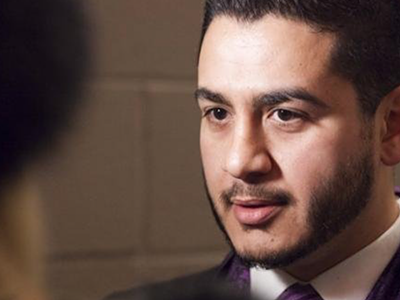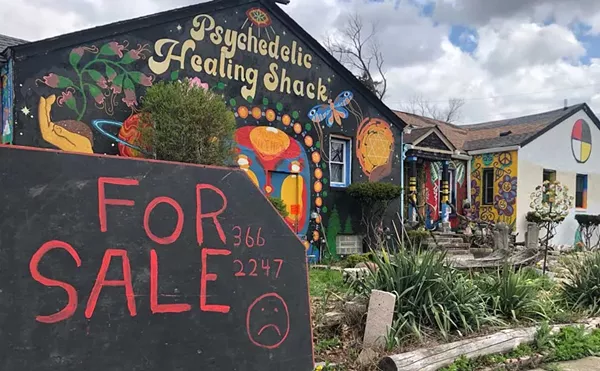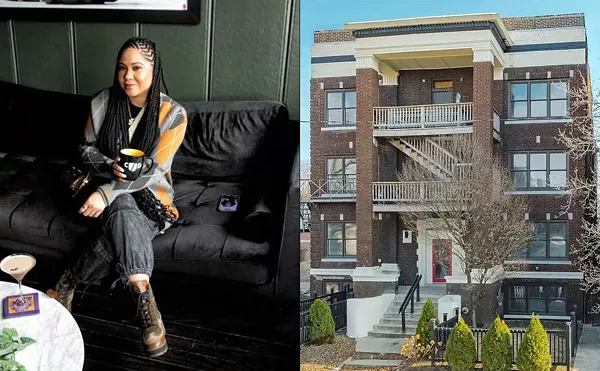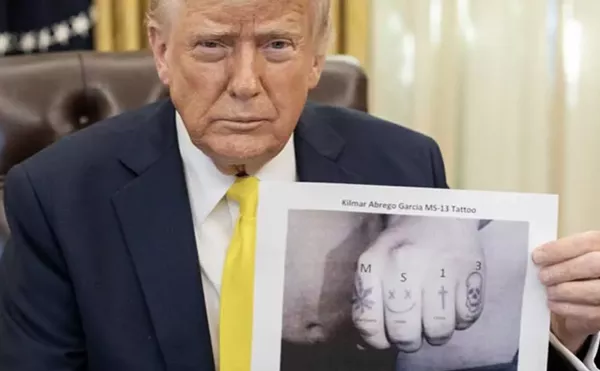
Audio By Carbonatix
[
{
"name": "GPT - Leaderboard - Inline - Content",
"component": "35519556",
"insertPoint": "5th",
"startingPoint": "3",
"requiredCountToDisplay": "3",
"maxInsertions": 100,
"adList": [
{
"adPreset": "LeaderboardInline"
}
]
}
]
There I was, bouncing around in the passenger seat of a borrowed pickup truck with a blindfold over my eyes. Mulenga Harangua was at the wheel driving us through a maze to his new secret spot. I was wearing the blindfold because he didn't want me to know exactly where it's at. The back of the truck was loaded down with wooden pallets we'd scrounged up around the west side, along with a few boards, bricks, and a few other things.
We hit a bump and I bounced over against Mulenga's shoulder.
"Well this ain't cuddling on the QLine, but it will do," I quipped.
"Cuddling on the QLine," sputtered Mulenga. "I had hopes for that in the beginning, they could have built a real train, a real building block for transit for this city. But it looks like they decided to just put in something for the tourists to get around and spend money. Cruising slowly along the curb so riders can view storefronts is pretty bald-faced capitalism. That's about making money in Midtown. It's not about creating a transit system for Detroit."
"Well, listen to you," I said. "The irony of it is that train lines are great development drivers when done right. But I don't think this was done right. They didn't need to lay tracks to put in a cute little trolley that lets you cruise the storefronts."
"Well there's no QLine over here," Mulenga stated proudly. "This here is the anti-Q — no train, not tracks, not even a road."
"Why are you being so secretive?" I asked.
"Because I'm digging in deeper underground," Mulenga said. "I can't have any leaks. Look at the president. Leak, leak, leak and he's going down. I'm not going down, my whereabouts are strictly on a need-to-know basis. Pretty much at this point only I need to know."
"Well I know where you are," I said.
"What?" Mulenga asked with a bit of alarm in his voice.
"Right next to you," I said in a lame punch line.
"And we have arrived," Mulenga said, turning the engine off. "You can remove your bandanna."
I pulled it off and looked around. We were indeed surrounded on all sides with trees and bushes, with little to indicate that we were somewhere in Detroit — just a couple of poles with wire in the distance. There were a few lean-to looking things with barrels underneath, a small garden with young plants, and a handful of chickens scratching around. I also spotted a small fire pit and a few domestic items by one of the lean-tos.
Mulenga was out and pulling pallets off the back of the truck.
"So what are you going to do with this stuff?" I asked.
"Chicken coops," he said. "I'm building chicken coops."
"I thought you were a free range chicken kind of guy," I teased.
"That's right, but some free range dogs came through here the other day and snacked on a few of my chickens," he said. "Now I need to put them safely away sometimes. I want to grow my flock."
"How many chickens are you planning on eating?" I wondered aloud.
"I don't plan on eating all that," Mulenga said. "I'm getting into the chicken business."
"What?"
"The chicken business," he repeated. "I'm getting in early. I think there is going to be big demand for fresh organic chicken pretty soon."
"Why is that?"
"Didn't you see that agreement the government just made to import chicken and chicken products from China?" he asked pointedly.
"No."
Mulenga started dragging pallets under a nearby tree. I did the same.
"A few weeks ago I was listening to National Public Radio and I heard this story about the U.S-China trade deal," Mulenga explained. "Part of it is that we'll be importing cooked chicken products from China."
"Cooked chicken products?" I repeated, a little confused on Mulenga's point with his chickens. It's not like he was about to take on Chinese imports. A couple of his chickens started pecking around near my foot.
"Well mostly I've been getting their eggs," Mulenga said. "But China is notorious for its food safety scandals. A couple of years ago a Shanghai company that supplied McDonald's and KFC was selling past-date meat that had been repackaged with new dates on it."
"And?"
"Sooner or later somebody is going to get sick from Chinese chicken," Mulenga said. "After that, people are going to be looking for fresh local chicken." He swept his arm toward the area I guess he was planning on keeping his chickens. "I will be ready when that market breaks open."
"So you're going to be the chicken king of Detroit?"
"Why not?" he tossed back at me.
"So what's up with these lean-tos?" I asked in an effort to change the subject.
"These aren't lean-tos," Mulenga said. "These are to help me collect water in the rain barrels. "
"Why so many?" I gestured toward the others nearby.
"That's another project," Mulenga explained. "See, I heard about this study predicting that in the next five years more than a third of Americans will not be able to afford their water. I plan to have plenty of water around for my garden and chickens, so why not sell a few low cost bottles on the side?"
"You want to sell water?"
"Well maybe I'll just trade it for stuff," Mulenga said. "You never know what people have that you can use. Rainwater may be the purest water available. It just falls from the sky. It might be cleaner than whatever comes out of your faucet. The bottom line is that I'm getting out front on this stuff. I got water. I got chicken. It's not a bad spot to be in. Plus, I can gather up the chicken droppings and use that for fertilizer."
"So now you're getting into the food industry," I said. "That is the next step for the urban agriculture scene, but most of those folks are growing vegetables. It doesn't look like you have much of that over here."
"I've got plenty of vegetables growing in my other plots," Mulenga said. "I have to keep my spaces diversified in case somebody decides to put a development in. That happened to me once. I had a great little squat on the west side with lots of space. One day the bulldozers showed up and started clearing things out. They put up a bunch of condos."
"Ouch!" I sympathized with him. I started to take a close look around. "So where are we? I need to get going."
"Can't tell you that," Mulenga said. "If you need to go you need to put that blindfold back on."
I pulled out the bandanna and wrapped it over my eyes. Mulenga took my arm and led me to the truck. It may have been a case of the blind leading the blindfolded.






